#abolish penal labor
Explore tagged Tumblr posts
Text
Guantanamo Bay is a torture center.
I encourage all Americans who care about cruelty and injustice to protest against Guantanamo Bays' continued existence.
On a similar note, the fact slavery is allowed in many states as a form of criminal punishment, which is also stated within the constitution, is the most vile thing I have recently discovered.
Use your voice to stand against gross injustice like this
#human rights violations#human rights abuses#guantanamo bay#united states#cuba#usa#us#abolish slavery#abolish penal labor#forced penal labor#us penal labor#penal labor#abolish forced penal labor#arbitrary detention#human rights#human rights advocacy#injustice#stand against injustice#use your voice#protest#united states of america#prison slavery#slavery#abolish prison slavery#abolish guantanamo bay#torture#torture center#guantanamo bay is a torture center
0 notes
Text
"The suit describes how incarcerated Alabamians are forced to work for free in prison and paid extremely low wages to work for hundreds of private employers — including meatpacking plants and fast-food franchises like McDonald’s — as well as more than 100 city, county and state agencies. And it alleges that the state keeps the scheme going by systematically denying parole to those eligible to work outside jobs. ... In the case of the government officials, they’re also accused of conspiring to increase the size of the Alabama prison population — which is predominantly Black — through the discriminatory denial of parole so the state can continue profiting from forced labor. '[Prisoners] have been entrapped in a system of ‘convict leasing’ in which incarcerated people are forced to work, often for little or no money, for the benefit of the numerous government entities and private businesses that ‘employ’ them,' the suit charges. In Alabama, that charge comes with ugly historical baggage. Convict leasing — a practice of forced penal labor prevalent in the post-Emancipation South (in which incarcerated men were 'leased' to private employers) — was a massive state revenue driver. Thanks to the Black Codes, a racist program to criminalize petty offenses both real and imagined, Black people were locked up at a massively disproportionate rate to their white neighbors. Many were then sent to work on plantations to fill the labor gap left by Emancipation. ... Convict leasing was formally abolished in Alabama in 1928, but prison labor has remained a significant source of income for the state. ... According to the lawsuit, Alabama reaped a $450 million benefit from forced prison labor in 2023 alone. ... Lakiera Walker worked for Jefferson County doing roadwork for approximately two years and was paid a $2 daily wage to handle large trash removal (including a Jacuzzi). She found out that the non-incarcerated workers on her team were making $10 per hour for the same job. One day, the lawsuit alleges, Walker’s boss attempted to coerce her into unwanted sexual activity; when she refused, he wrote her up on a disciplinary offense for 'refusing to work.' She was then sent to work unpaid in the prison’s kitchen, and when her family called the commissioner and the warden to demand something be done, no action was taken. ... During Walker’s 15-year incarceration, she held a litany of unpaid jobs throughout the prison itself, too, including in the kitchen, housekeeping and healthcare. She even provided hospice care to dying patients. 'The nurses really weren’t interested in taking care of sickly or terminally ill people, so they would get the inmates to do it,' Walker says. She says she was regularly required to work seven days a week, and she often had to work two shifts a day. None of these prison jobs were paid, and quitting or refusing work was not a viable option. 'You can’t say, ‘Hey, I can’t go to work today,’' Walker explains. 'You would go to segregation, which was solitary confinement. … People were so tired and just hopeless at that point, they would kind of welcome solitary confinement, just to have a break.'
... Walker did finally make it home after all those years of forced labor, but many others are still trapped in the system. ... By 2022, the parole rate was 11% overall and only 7% for Black prisoners — meaning that 93% of parole-requesting Black prisoners were denied. That’s what happened to Alimireo English, a charismatic 48-year-old Black man who, according to a judge, should not be in prison right now. ... But instead of being back home with his family, at church with his faith community, or visiting his eldest son in New York, English is at the Ventress Correctional Facility in Clayton, Ala. His case did not come before the parole board until November 28, 2023, more than two years after he’d already been acquitted, but he was denied anyway. His next parole date is November 2024. 'They gotta keep me for another year until they can find somebody else on the street that they can pull back in and take my place,' English tells me. 'If they can’t replace you, they don’t let you go.'
... English works as a dorm representative for the facility’s Faith Dorm, where he is on call 24 hours a day, seven days per week. He is responsible for the safety and well-being of 190 incarcerated men, many of them elderly or medically vulnerable. He handles custodial duties and maintenance, screens dorm visitors and is also the first responder for drug and health emergencies. In his scant free time, he runs a therapy and counseling group for his fellow prisoners. He consistently works 12 to 15 hour days and, for most of the week, he is the sole individual in charge of the dorm; a retired prison chaplain comes in to assist him a few times weekly, but otherwise English is not supervised by any corrections personnel. As the lawsuit highlights, 'Since Mr. English has been in this position, the Faith Dorm has had no fights, deaths, or overdoses.' The plaintiffs’ legal team estimates that ADOC saves roughly $200,000 a year by not having a corrections officer in that one dorm. Meanwhile, English is paid nothing. 'The inmates basically run the prison, but the officers are getting compensated for it,' English says. 'The wages the inmates are paid for their work hasn’t changed since 1927.'
Several of the plaintiffs I spoke to also mentioned 'institutional need,' a specific designation that plaintiffs have reported is added to certain prisoners’ files to signify their utility to their current facility. According to Walker and her lawyer, institutional need is yet another trick used by the ADOC to keep especially useful incarcerated workers from leaving, so the state can continue benefiting from that person’s skills. ... 'Most people, it stops them from going home or making parole because it says that we need you more in prison than the world needs you in society,' Walker explains. 'This lady, her name is Lisa Smith, she’s been in prison about 30 years, and every time she comes up for parole, regardless of her crime, she’s an institutional need. She can fix anything in the prison — she can probably build a prison — but she’s not getting paid. Sometimes they won’t even call in a free world contractor because she knows what to do. It’s looking bleak that she will ever make it out of prison, because they need her there.'
... Because of a 1977 Supreme Court decision, incarcerated workers in the United States — including those in ADOC’s work release program — are legally prohibited from unionizing. The Supreme Court decision barring incarcerated workers from unionizing has not stopped organizations like the Industrial Workers of the World’s Incarcerated Workers Organizing Committee, Jailhouse Lawyers Speak and the Free Alabama Movement (FAM) from organizing labor actions, strikes and protests against prison slavery, or individual prisoners from finding their own ways to dissent. ... One of the founders of FAM, Kinetik Justice, is a plaintiff in the Alabama lawsuit. He has helped organize and lead several high-profile nationwide prison strikes since 2016. He’s been in ADOC custody for the past 29 years, and he has been repeatedly punished, harassed and tortured for his work organizing against forced labor. According to The Appeal, he spent 54 months in solitary confinement between 2014 and 2018 and has been repeatedly sent back into the hole. As he told Democracy Now! in 2016, 'We understood our incarceration was pretty much about our labor and the money that was being generated from the prison system, therefore we began organizing around our labor and used it as a means and a method to bring about reform in the Alabama prison system.' He is no stranger to filing lawsuits on his own and his fellow prisoners’ behalf against ADOC, so it is fitting that this landmark class action suit bears his name."
48 notes
·
View notes
Text
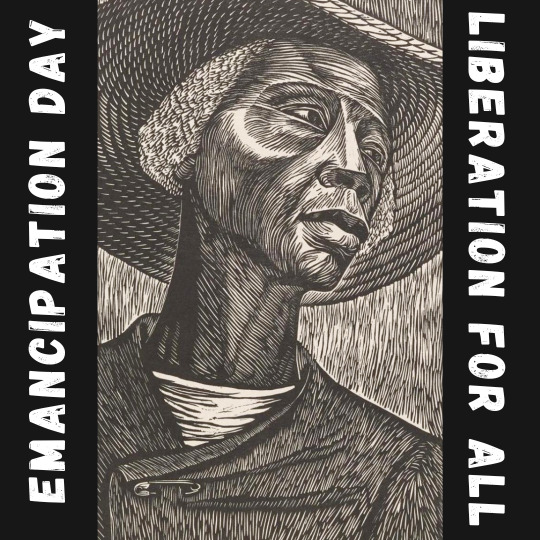
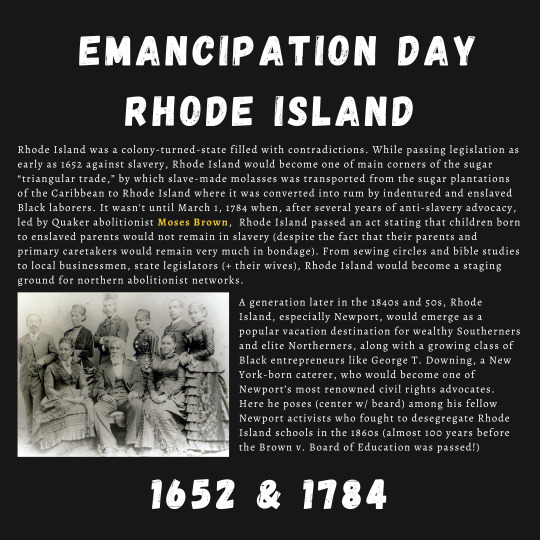
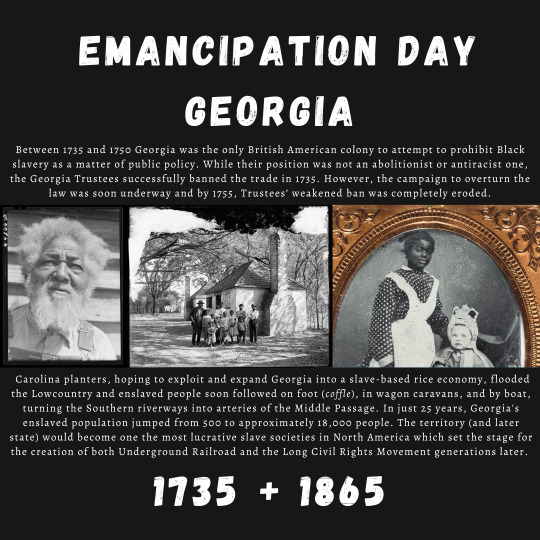
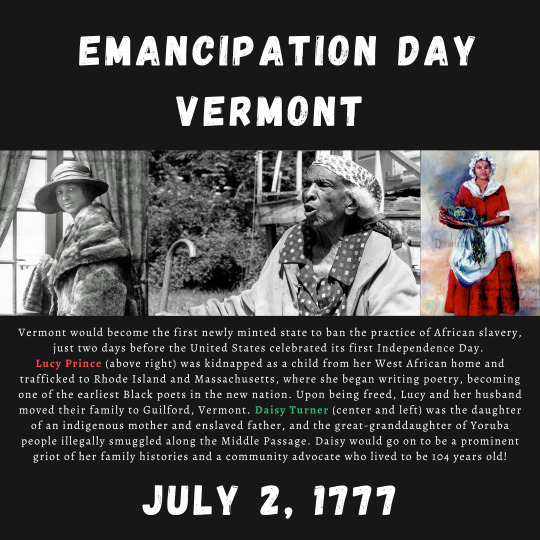
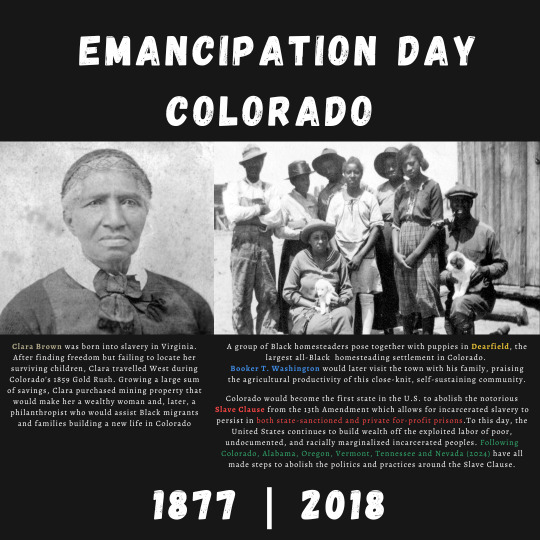
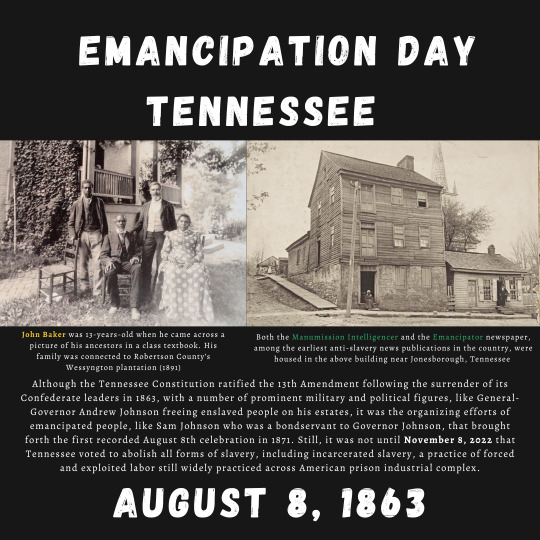
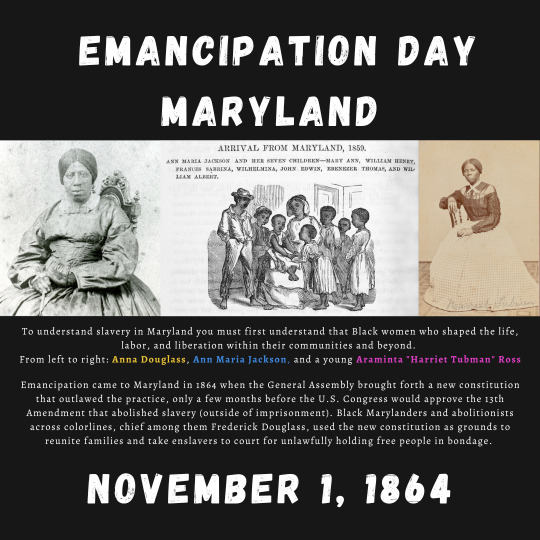
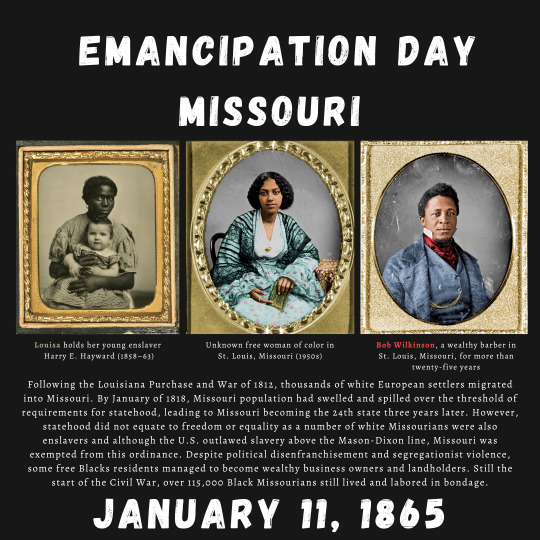
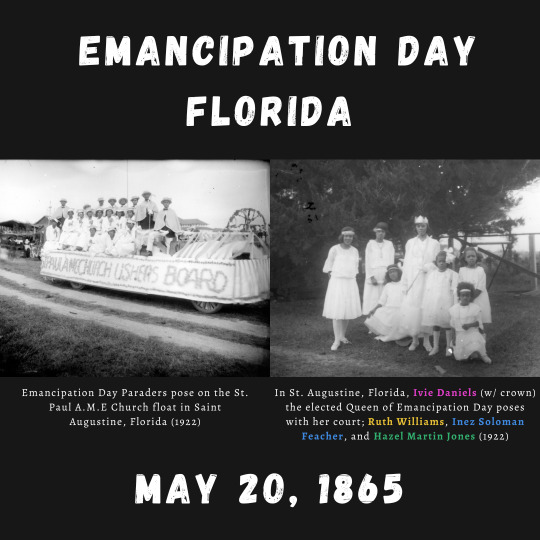
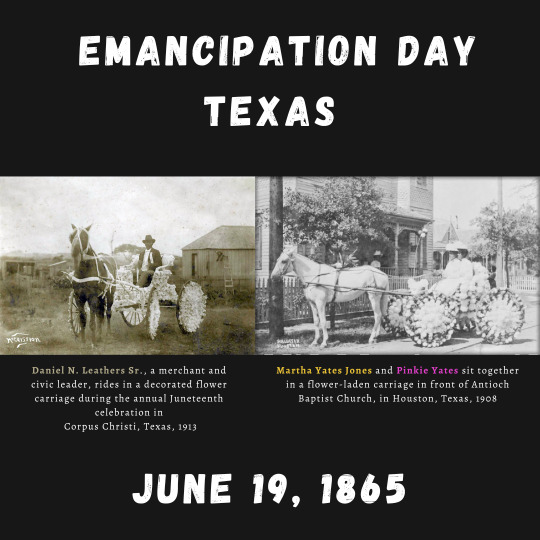
On August 8, 1863, Tennessee ratified the 13th Amendment, abolishing the domestic slave trade of Black + indigenous folks in the state. 159 years later in 2022, Tennessee folks voted to abolish all forms of slavery in the state, including the "Slavery Clause" that allows for incarcerated slavery to persist in both state-sanctioned + private for-profit prisons.To this day, the United States continues to build wealth off the exploited labor of impoverished, (dis)abled, undocumented + racially marginalized people who are incarcerated.
Each community and country that participated in the Transatlantic Slave Trade has its own emancipation day (or year).
And yet, as of 2023, Colorado, Alabama, Oregon, Vermont, Tennessee + Nevada (2024) are the only U.S. states who have made steps to abolish slavery in all its forms. That's not even touching how slavery, both state-sanctioned and illegal bondage, continues to bleed into our everyday places from child labor + forced s*x work to penal plantations and chocolate factories (looking at you at hershey chocolate)
In this second wave of Jim & Jane Crow flooding our world, we must arm ourselves with the tools to disrupt systems, distribute resources + deepen our collective action + good trouble ~
If you wanna explore the full Emancipation post + readings, come join us in the garden community over on Patreon where we upRoot our miseducation through history lessons, community conversations + book talks + decolonizing our everyday practic, our classrooms + our communities.
Reclaim your emancipation + immerse yourself in the ancestral, antiracist liberation! 🖤✊🏾✨️
#prison abolition#our world#black lives matter#ecosystem of white supremacy#our history is your history#politics#13th amendment#padawan historian#cite black women#reclaim the fourth#emancipation day
91 notes
·
View notes
Note
On the topic of incarceration vs. the slave trade, I think part of the problem is people conflating penal labor with incarceration in general. Infamously, in the US, the 13th Amendment abolished chattel slavery but carved out an exception for forced labor as a legal punishment, which uh explains some things about the American penal system. More generally, prisoners as a labor pool creates an incentive to imprison people, especially when combined with convict leasing and private prisons; even without a racist history of chattel slavery, a demand for convictions will fall hardest on "undesirable" groups. But it's possible to keep dangerous people away from society without forcing them to work; for example I haven't heard of it happening in Norway's famously cushy (relatively speaking) system.
Ahhhh yeah, if the question is “how are penal labor and the slave trade different,” that makes more sense as a comparison.
I still think they might well be different in ways we can notice and talk about but yes, both those things are bad.
12 notes
·
View notes
Text
~Happy Juneteenth~
Today, more than 100 years after what we’re taught was the abolition of slavery in the United States, state-sponsored slavery remains alive and well in the US, in the form of organizations like UNICOR and other arms of the prison industrial complex (PIC), and I figured putting even a few more eyes the topic could be a good use of my little platform on here, however small though it may be.
I’m far from any kind of authority on the topic, so I found some better sources y’all should really check out if you feel so-compelled:
Prison Abolition Links from The Marshal Project
Penal Labor in the United States (via Wikipedia)
Collected Learning Resources from Project NIA
The PIC is…
Abolitionist Toolbox (collected informative art/graphics + articles, provided by Project NIA)
Groups/efforts to support or get involved with:
Black & Pink: Abolitionist group providing legal support and seeking justice for LGBTQIA2S+ and HIV-positive incarcerated people
Critical Resistance: CR is an activist organization seeking to abolish the prison industrial complex. They advocate for current and formerly incarcerated people and aim to build a grassroots movement to dismantle the PIC
Project NIA: Activist org focused on ending youth incarceration and supporting at-risk, currently, and formerly incarcerated children and young adults
This post is far from exhaustive, so if you’ve anything relevant to add, please do!
7 notes
·
View notes
Photo




San Lucas Island Prison
It seems the Ghost Hunters International team has become fascinated in investigating the penal system around the world. Their next stop is San Lucas Island in Costa Rica. This island’s history horror began in the 16th Century. The Spanish conquistador Gonzalo Fernandez Oviedo used San Lucas as a concentration camp for local Chara people. These people were slaughtered on the site of their sacred burial grounds.
A few hundred years later, San Lucas was turned in to a penal island. The prison was constructed in 1873 by dictator Tomás Miguel Guardia Gutiérre. It was dubbed the Caribbean Alcatraz. However, San Lucas also didn’t achieve the inescapable label so many prisons sought. There were many daring escapes to shark infested waters and tragic failures. But then again who wouldn’t want to attempt freedom from one of the most heinous prisons known to man.
Only the worst criminals in Costa Rica were sent to San Lucas. The prison was considered the largest in the country’s history. The former buildings include a historic dock that is still in use after the first dock was destroyed, a Catholic church, a medical building, temporary holding cells, a three story main office, a large concrete disc used to hold a water tank, and water pumps. There are also several water pumps and a cemetery under excavation on the island. There are prison cells of varying security levels, containing the typical graffiti such as religious phrases, pornographic images, signatures, and drawings. The above statement is written in one of these cells.
The death penalty was abolished by Gutiérre a year after the prison opened its doors. However, with such prison conditions, a stint in San Lucas was a death sentence in itself. Sixty to a hundred inmates occupied one cell at time. Cells contained low ceilings, few windows, and iron beds with thin mattresses. Those without a bed slept on the floor. Each prisoner was issued a ball and chain. The weight of the ball was determined by how dangerous the inmate was deemed to be.
Inmates labored in the tropical sun, breaking rocks and harvesting salt from the sea. “The Disk” sits in the center of the prison courtyard. In the middle is a hole half filled with water. This was considered solitary confinement. Some inmates spent months in there with only 15 minutes above ground each day. A former inmate, José León Sánchez, wrote a fictional account of his incarceration at San Lucas titled La Isla de Hombres Solos or The Lonely Men’s Island. The prison remained operational until 1991. The island has since been turned in to a wildlife preserve and San Lucas is now opened as a tourist attraction.
Many believe the former inhabitants of this maximum security facility are still roaming the property.
#San Lucas Island Prison#haunted prison#haunted locations#paranormal#ghost and hauntings#ghost and spirits#haunted salem#myhauntedsalem
6 notes
·
View notes
Text

For MLK day ,,, consider watching this production on Netflix … 13th is a 2016 American documentary film directed by Ava DuVernay. It explores the prison–industrial complex, and the "intersection of race, justice, and mass incarceration in the United States".3
The title refers to the Thirteenth Amendment to the United States Constitution, adopted in 1865, which abolished slavery throughout the United States and ended involuntary servitude, except as punishment for convicted criminals. The film argues that this exemption has been used to continue the practice of involuntary servitude in the form of penal labor.
@hrexach
#dr rex equality news information education#graphic source#graphic#graphics#hortyrex ©#horty#quote#it is what it is#documentary#ava duvernay#13th amendment'#usa constitution#American documentary#film#usa#involuntary servitude#penal labor
0 notes
Text
A utopian fiction that's "we got rid of capitalism!" and the pov character is "how?" "We got rid of slavery!" "But... so did we."
And then they drill down into penal labor, youth minimum wage, subminimum wages, etc and the pov character admits "oh, shit, maybe we didn't abolish slavery"
0 notes
Text
If you dont live in a country maybe stfu about that countries voting. Especially if you’re going to get mad at people who are voting for harm reduction and think the outcome of the actual election is already guaranteed to be bad. Yes, both sides have shitty foreign policies, but one side can be convinced to be less evil and also isn’t literally openly planning to turn this country into a fascist regime if they win. Voting isnt gonna get in the way of people doing a violent revolution if you think that’s what’s necessary. And voting uncommitted only works in the primaries because it sends a message without risking this country becoming a literal hellhole for everyone that isn’t straight, white, cis, abled, and affluent.
Seriously, “oh you only vote based on domestic policy not foreign policy”, the group that has better domestic policy also usually has less evil foreign policy too. Republicans are trying to make being queer illegal again, Florida made it illegal to say the civil war was was about Slavery (it was absolutely about slavery, not just state rights, because the south wasn’t happy the north wouldn’t ship escaped slaves back to them either). Do you really think that a republic regime wouldn’t be openly and gleefully genocidal? They would also oppress any information they want to and probably even try to change the damn constitution.
I know the world doesn’t revolve around America but our government likes to pretend it does and is very influential. We have to take care of ourselves before we can take care of others. It’s like the oxygen mask thing. The simple fact is, the people who care about other people aren’t the ones likely to start a violent revolution.
Like, come on, we know this country sucks. There’s a housing crisis and greedflation, we stick our nose in other countries affairs when we really shouldn’t, and when we should be doing something we do the wrong thing. We need to send aid not bombs. We need to open our borders not close them. We need to stop blaming undocumented immigrants for companies being greedy and firing others so they can underpay the desperate. Abolish ICE, free the prisoners (the ones that ICE took), completely rework the penal system into something more aimed at rehabilitation or if that fails just keeping those people humanely contained but not as slave labor. Also cops need to be completely changed. Whole system is bad atm. Yes there needs to be some sort of peacekeeper role, but this current system aint it.
0 notes
Text
I am going to remind you all that the slaughterhouse firm Packers Sanitation Services Inc. has just been found to have been exploiting over 100 children, some as young as 13, and forcing them to perform dangerous, overnight jobs (x). While many are no longer working for the company and there doesn’t seem to be evidence of human trafficking, in January the Department of Homeland Security began investigating if outside traffickers were forcing children into the country and working for PSSI in order to profit off of them. PSSI has since paid a $1.5 million fine for the violations, which was about $15,138 per child.
It is no coincidence that Iowa lawmakers are trying to re-legalize child labor now. If they too are caught in the act or even if one audit looks off, they don’t want to be penalized for it.
There’s also a very good argument to be had here that in a nonexistent labor shortage, companies just don’t want to pay employees a living wage with benefits. Kids, however, can be and often are underpaid and rely on their parents and guardians for healthcare access. In addition there’s a non-zero chance that if homework gets abolished in public schools, multiple companies can and will exploit that extra free time as much as they can.
Call your legislators. Write more than one angry email. Do your research and vote in your local elections. Make your politicians aware there are consequences for their actions. Protest. Go Karen-level feral.

also let's ppl as young as 14 drive the death machines we call cars to and from their job late at night

let me re-emphasize this part:
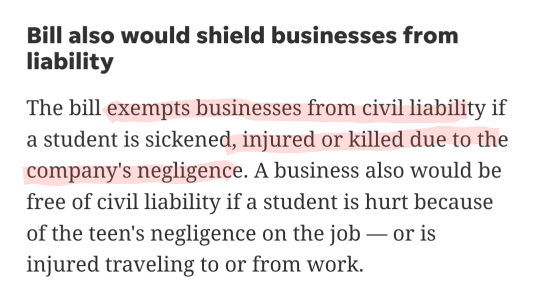
35K notes
·
View notes
Text
To bring to light the problem with globalization being used by the Power Elite Controllers to increase full spectrum dominance in every aspect of our lives in order to profit from and continue their hidden business activities of Human Trafficking, mass slave labor and unlimited access to the worlds’ children, is why this topic is being discussed. The Globalization Agenda of the Great Reset is intended by the NAA to usher in the One World Order or Agenda 2030 as the fourth industrial wave transitioning humanity into transhumanism and technocratic control, which is planned to bring the complete and total slavery of the entire global population on the earth surface. To achieve this Great Reset, an imaginary and concocted global pandemic has been created in which the last vestiges of human rights that are protected under the United States constitution and the Law of One of which it represents, are being viciously and ruthlessly attacked by the Anti-Christ forces. The U.S. Constitution is the foundation of our economic and social system, and it has outperformed the rest of the world’s other social and economic systems for centuries. But, according to the founder and chief executive chairman of the World Economic Forum, Americans shouldn’t have a say in this matter. We are supposed to transfer all our wealth and resources for the elite pedophiles to decide how to take complete control over our lives whether we like it or not. This is a radical move towards collectivism in which all personal autonomy, individuality and Self-Sovereignty is intended to be permanently destroyed, which is a remarkable and dangerous moment for personal freedom in the United States and across the planet. Take note and pay attention to those in positions of globalist power or in the governments that are promoting the globalization-socialism agendas of the World Economic Forum and the Davos, Switzerland elites. Proclamations from Prince Charles and other elite world leaders as well as those politicos onboard with the globalist agendas, are publicly talking about changing the entire world all at once and soon. The scale of change that globalist elites are calling for through the vehicle of the Great Reset, requires the implosion of the current world structure in order to lay the foundations for their One World Order tyranny. Pay attention to the flowery words and empty promises propagandizing the Great Reset with online pictures of deliriously happy people with key phrases like, ‘You’ll own nothing and be happy’. This is the largest attempted stealing and transfer of national wealth and power for instigating global human slavery under the Luciferian Covenant, along with the theft of every last drop of global human resources through an orchestrated plandemic with the strong-arm response of bullies designed to abolish western culture. The extremely profitable business models in the giant multinational corporations are not being penalized or held accountable to the rule of law in situations that promote criminal behaviors that foster mass global slavery, human trafficking and child sexual exploitation. If people remain unaware of the global scale of these operations, that human trafficking, Adrenochrome production, child and Organ Harvesting is run like an everyday corporate business model, then we will never actually see the scope in which this is happening and these crimes of human torture remain free to continue
3 notes
·
View notes
Text
Some off the other statewide propositions on the California ballot this election:
Raising minimum wage.
Two prison-related propositions: one measure to abolish forced, unpaid prison labor and one to penalize drug offenders more.
A constitutional amendment that would reverse the 2008 Prop 8 and take out the "between a man and a woman" definition of marriage in the California state constitution -- this would not make any difference immediately due to the Supreme Court decision legalizing same-sex marriage nationally, but if the decision gets repealed in the future it would become relevant.
Something about being able to pass bonds for affordable housing with 55% of the vote rather than the current 2/3 vote -- the San Francisco Chronicle is against it, for reasons I haven't quite parsed yet, but the more left-leaning San Francisco Bay Guardian is strongly for it. Fortunately we've got a few more weeks so I have time to decide whether the Chron is just being weirdly reactionary again or whether they actually have a good point.
Prop 34 is one of those where the wording looks reasonable, but once you get someone to explain the context you find out it's the exact opposite (and as far as I can tell, everyone (ie the news sources) is in agreement that it's entirely about penalizing the AIDS Healthcare Foundation.) I was going to add something on about that, so I'm glad someone beat me to it.
Rent control is on the ballot for California voters this November.
I uh, get that tumblr isn't exactly sorted by geography, but this is a huge deal.
It's a huge deal even for people who don't expect to be personally affected by it -- rent control is a protection against the poorest people living in a city being forced out, and that's just bad for everyone. When you have a city where only medium well off to rich people live, you get their service employees coming in from a suburb an hour and a half away (blech) or else you get people stacked three to a room. Or people holding down a job or three while trying to earn enough to get off the street or, well, out of their parents' place or away from the abusive partner they can't afford to break up with. Point is, a lack of housing that people can just keep living in at the same price, means a lot of bad things for society, and we probably aren't going to socialize housing within the next ten years but maybe we can get rent control back.
#I really cannot express how much I would have thought through my wording more carefully if I'd known this post#was going to get over 20k notes#this is one of two posts I've written in my entire time on tumblr that's gotten this sort of response#and I wasn't expecting the other one to blow up either
25K notes
·
View notes
Note
ok so awhile ago you said you'd be willing to talk about the history of the legal defense of insanity, are you still willing to do that? btw I love reading all your stuff, it's so well thought out and written that it's just a treat to read!
(Thank you! I’m glad my meta has been interesting/useful to you.)
(With reference to this previous post)
The following is a brief timeline of major modern (and modern-ish) developments of the insanity defense in the UK and US, and then some reference links. It is hardly comprehensive, but should give a pretty decent big-picture view.
Writing this (and the reading I did previously) has made me really want to get into aspects of the topic - namely, the development of the psychiatric profession and its links to criminal law - a bit more as directly pertains to Hannibal, too, and I was originally going to do that on this post, but uh, that was about two and a half hours ago, and it deserves more than just a couple of paragraphs, so I’ll save it for a later meta post that’s fully focused on the show.
So, all that said....
In 1800, James Hadfield attempted to murder King George III, and was acquitted after successfully challenging the previously-existing standard for legal insanity (which had stipulated that the defendant could not demonstrate any ability to reason whatsoever). While it was clear that most of his higher faculties were intact, it was argued that he should be considered insane due to having acted under a religious delusion, which was attributed to severe head injuries he’d previously sustained as a soldier. He was acquitted for the capital crime of treason, but committed to an asylum for the remainder of his life, as he was considered a continuing danger to himself and others (contrary to previous cases, in which acquitted defendants had typically been released into family care), and the precedent was passed into British law by Parliament soon after that.
In 1843, Daniel M’Naghten was attempting to murder the British Prime Minister, and fatally shot the Prime Minister’s secretary along the way. He was found not guilty on the basis of a persistent delusion that the Prime Minister was engaged in conspiracy against him. It should be noted here that this was a time where the psychiatric profession was making a major push to distinguish and legitimize itself as a group of experts on the workings of the mind, and how that related to criminality. There was a substantial public backlash to the decision, resulting in the codification of the “M’Naghten Rules,” which to this day are cited in pretty much any discussion of the subject of the insanity defense. The essentials of those rules were that a defendant had to:
be suffering from a “disease of the mind” such as to either
not understand the “nature and quality of the act”
or not understand that the act was wrong
In 1863, these rules were somewhat tested and solidified when George Townley murdered a woman for breaking off their engagement. One of the expert witnesses from M’Naghten’s trial took up his defense, and argued that Townley’s lack of remorse and assertion that he was “not responsible to God or man” was clear evidence of insanity. Townley was found guilty on the basis that he clearly knew what he did, and that it was contrary to both the laws of God (the sixth commandment) and man. The ensuing events were complicated - positive public reaction to the verdict and a corresponding derision of the psychiatric profession, a renewed inquest into his sanity and campaign by his wealthy family to prevent his execution (his sentence was eventually commuted to life imprisonment with hard labor, which was quickly cut short by his suicide, which launched a whole new discussion over the matter of his sanity or lack thereof...) - but ultimately resulted in a lot of ink being spilled, both in reference to the Townley case and others that followed it, over the question of distinguishing between, essentially, delusion and homicidal compulsion (or “irresistible impulse”).
The M’Naghten standard was generally accepted in the US, albeit with various adjustments on a state-by-state basis. In 1954, a more expansive “product test” was established in Durham v. United States, which added the concept that an insanity defense may be permitted if the crime was the product of a mental illness (however that may have manifested). This was not a popular decision, and in 1962, the new Model Penal Code established something of a compromise, stating that a defendant may be found not guilty by reason of insanity if “he lacks the substantial capacity either to appreciate the criminality (wrongfulness) of his conduct or to conform his conduct to the requirements of the law.” (This is considered a “cognitive” and “volitional” pair of prongs.)
Then, in 1981, whoops, John Hinckley shot President Ronald Reagan and was found not guilty by reason of insanity, and Congress didn’t especially like that, so in the Insanity Defense Reform Act of 1984, they removed the “volitional” component of the insanity defense from federal considerations, shifted the burden of proof for insanity to the defense, and raised the standards of that burden of proof. Many states followed this decision, while others adopted even stricter rules for an insanity defense, or abolished it altogether.
That’s the standard of where things are in the US today - the federal rules following the 1984 law, and states having various individual rules. In a 2020 Supreme Court decision, Kahler v. Kansas, it asserted that individual states are not obligated to allow an insanity defense that hinges on the defendant’s capacity to determine right from wrong (the “morality” prong of the M’Naghten standard).
Maryland, incidentally, has one of the more expansive sets of insanity plea rules among US states.
It should generally be noted that insanity pleas get a rather disproportionately large amount of press mileage relative to their frequency - especially in modern times, they’re rarely attempted, and even more rarely successful. Since involuntary psychiatric commitment following a successful insanity plea may end up being longer than a normal prison sentence, it’s pretty much only strategically useful for avoiding a death sentence.
Some (open source) references:
“Moral insanity and psychological disorder: the hybrid roots of psychiatry,” 2017. A UK-based historical perspective (pre-20th century)
“The Insanity Defense,” 2005. A brief summary of the insanity defense in the US.
“The Insanity Defense: A Comparative Analysis,” 2010. An honors thesis about the insanity defense in the US, and its differing state standards.
Kahler v. Kansas, 2020. The SCOTUS ruling.
“Defending the Mentally Ill in Maryland: The Guilty Plea vs. the Insanity Defense,” 1984.
#hannibal adjacent#meta#my meta#sort of#i'm tagging it that way for easy reference on my blog#replies#Anonymous
29 notes
·
View notes
Quote
I think there's still some disconnect amongst liberals as to why those further left are calling for the police to be defunded and ultimately abolished, even if they have come around to see that the police are not ultimately on the side of the populace or invested in protecting the communities in which they terrorize. The reason that we call for such a hardline measure, the reason that all cops are bad, is because even if all police brutality and excessive force were to end today, in this instant, the principles on which the police, nation wide, stand and the laws they uphold, as well as the biased application of those laws, would still stand. We live in a country where poverty is taxed, penalized, and heavily legislated. But even without getting in to how poverty increases the likelihood of interaction with police, or how poverty in inner city communities is directly the product of systemic white supremacy, let's talk about the practice of police in terms of traffic patrol. The fact of the matter is that Black and Latino men are 3 to 4 times more likely to be pulled over than white people, nationwide. Of those pulled over, Black and Latino men are 4 times more likely to be subjected to search than white people pulled over. It's note worthy, though not ultimately the point, that Black and Latino men are found to be in possession of illegal contraband, specifically drugs and weapons, 26% less often than white people searched in said traffic stops. Black and Latinx people are more than twice as likely to go to trial for these offenses. They're more likely to be represented by a public defender, more likely to be found guilty, are statistically sentenced drastically more severely and are more likely to serve out their sentence in full than their white counterparts. That is to say, it is blatantly obvious when looking at the numbers, devoid of feelings or instances of police violence, that there is a concerted effort to patrol Black people and especially Black men, even in the absence of obvious criminal wrong doing. Further more, it should be considered the way indiscriminate arrest, witness and suspect testimony coercion, and predatory plea bargaining practices are leveraged against Black defendants, who might reasonably fear the lack of competent defense they'll receive and likelyhood of conviction and severe sentencing they'll face, when considering the probability of imprisonment of innocent people. Keep in mind this happens nationwide and has been found to be universally true, between urban, suburban and rural areas, and without regard to incidence of violent crime and gang activity in any given community. A lot of white liberals I've talked to roll their eyes, or are in disbelief, or try to say things have changed, so they can wave away the fact that the police force as we know it today literally grew from slave catchers of two centuries ago as distant history and irrelevant. But the 13th Amendment to the Constitution, which ostensibly abolishes slavery, makes an important caveat. "Neither slavery nor involuntary servitude, except as a punishment for crime whereof the party shall have been duly convicted, shall exist within the United States, or any place subject to their jurisdiction." EXCEPT AS PUNISHMENT FOR CRIME WHEREOF THE PARTY SHALL HAVE BEEN DULY CONVICTED. So you have an institution that grew from slave catchers, targets minorities at a rate of approximately 4 times the rate of white people, searches them, tries them, and sentences them exponentially more severely than white people, and then offers the incarcerated up to for-profit prisons owned by government cronies, to work as slave labor, generating profit just by being there, as well as via the labor they're forced to perform in a multitude of capacities. I don't know about you, but I was taught slavery is wrong. The immorality of the police doesnt stop with their reckless doling out of violent capital punishment, it starts there. So long as this institution is allowed to exist, it does so to incarcerate Black men to serve as slave labor for the state and its most wealthy and powerful beneficiaries. That's why the police must be defunded and abolished.
ACAB
2 notes
·
View notes
Text
✊🏽 🌈 😷
Hello hello hello! Happy Pride, and a very happy Juneteenth to you all! For those of you who don’t know, Juneteenth is a holiday that commemorates the day the final group of enslaved people was freed in Texas in 1865 (which was two years after the Emancipation Proclamation was signed… but that’s beside the point). So I recently took about a month-long unplanned break from social media, because, as I’ve said before, I’ve been REALLY low energy these past few weeks, what with everything that’s been going on in the world. I am at the intersection of multiple marginalized groups, and that knowledge can be very heavy sometimes. But I wanted to make a post today in my own words, because I realized my staying silent doesn’t help me or anyone I care about; it only helps maintain the status quo. So now I’m here to check in with all of you and to put my thoughts and feelings on the record.
First of all, I’ve been doing a lot of drawing and writing and bingewatching and bingeplaying video games since quarantine started, and I’m having a great time with that! But I’ve also been staying up-to-date on the news, as any good person should, and what I’m seeing isn’t so good. More and more Black people, including children and the often overlooked women and trans folk, are being murdered every day. Speaking of trans folk, their basic human rights are being taken away before our very eyes. Brown immigrants continue to be abused by our government. Indigenous people continue to have their bodies, lands, and cultures violated. People who riot and loot are being condemned in the name of “respectability politics,” despite the fact that they’ve been systemically disenfranchised all their lives, and their anger is justified. People who oppose fascism are being dubbed terrorists. The pandemic isn’t getting any better, but people are acting like it’s over. Political leaders and celebrities who claim to be on our side are taking performative action that does nothing to foster actual progress. And that’s just in the United States! There are more crises going on in countries around the world than I can even think to name.
So right now I’m doing what I can to stay safe and sane and help out in whatever small ways I‘m able to. That means continuing to practice social distancing while also signing petitions, spreading information, supporting my fellow Black and Brown and LGBT+ artists/businesses/individuals, elevating our voices, and donating wherever I can. But Juneteenth is about education, and I’ve also been doing some reading. I have two really great books to recommend to you, if you haven’t read them already:
The first one is called The End of Policing, and it’s by Alex Vitale; it basically breaks down that phrase that seems to scare and confuse a lot of people: “Defund the police.” Vitale talks about how policing as an institution is ineffective at its best and harmful at its worst, how attempts at reforming the institution are also ineffective, how policing permeates every area of our society, including schools and politics and several other places where it doesn’t belong, and about the criminalization of homelessness, sex work, drugs, gangs, immigration, and more. The End of Policing is available as an ebook for free right here, for your convenience!
The second book is by the great political activist Angela Davis, and it’s called Are Prisons Obsolete? Like Vitale, Davis questions and critiques an institution which is often said to be in need of reform when it actually, she argues, needs to be done away with entirely. She talks about how the current system incorrectly values punishment and vengeance over reform and rehabilitation, how people of color are vastly overrepresented in the penal system, how the system treats people of color, women, the disabled, the mentally ill, the poor, and LGBT+ folk differently from well-off cishet white men, and how prisons have become an industrial complex that serves capitalistic desires over human needs. This one is also available for free, as a pdf right here, for your convenience!
Both authors discuss controversial, interconnected topics through thorough research, write in clear, concise, and fact-driven language, dive deep into the history of policing and prisons in America and around the world (including their shared origins in slave-catching), and finally offer alternatives, which are detailed, doable, and proven effective by precedent, such as decriminalization of certain acts and substances, and reallocation of bloated funds to areas that more effectively address crime at its source (as crime doesn’t happen in a vacuum, and mostly occurs as a direct result of people’s needs not being met!). I highly recommend these if you’re interested in reading. If not, there are lots of videos and infographics and articles that discuss these topics in much shorter, simpler ways, and a quick Google search will lead you in the right direction. 😉
In conclusion, coronavirus is alive and well, and so is racism. I urge my friends and followers not to be quiet about the injustices we have been facing every day for centuries, all over the world, and not to let the attention and momentum shift away from our movement. It doesn’t matter who you are or what you are or where you are. Keep wearing masks and socially distancing. Keep educating yourselves and each other. Keep protesting and contacting officials and donating and signing petitions. Keep supporting Black and Brown and Queer artists and businesses and individuals. Keep elevating our voices. Use your voice to call for an end to white supremacy, the patriarchy, and transphobia. Be careful with spreading images of violence (as they can be disturbing and disrespectful), as well as protestors’ faces (as they can be used to identify and track people down).
On a more personal level, respect and value the lives of people who look different from you. We don’t exist for you. We exist for ourselves. We are complete human beings, and we will not be broken down into parts for your easy consumption. And sure, voting is important, but direct action has proven to be much more effective at causing immediate change. I understand if you need a mental health break. As I said at the beginning, I needed a mental health break. But please do so quietly, safely, and respectfully, and don’t make this about you. I see some of you are still out here fighting the good fight daily, and I thank you for it. But I can’t begin to express how troubling it is to watch other people go about their lives as if all these crazy things aren’t happening. Remember, no voice is too small to be used as a platform of positive change! I realized that includes me. Now you need to realize that includes you!
Lastly: Black Lives STILL Matter, Black WOMEN’S Lives Matter, Black TRANS Lives Matter, Black DISABLED Lives Matter, Black MENTAL HEALTH Matters. Defund The Police. Abolish ICE. No One Is Illegal On Stolen Land. Eat The Rich. Pride Is A Protest. Be An Ally. We’re In This Together.
And once again, happy Juneteenth.
P.S: My book recs are free, and Google is free, but as my friend Javon so perfectly put it, “my emotional labor and racial education will only be free when I wish them to be.” So if you want to debate me on any of these topics, OR if you want me to do more research for you, I would be happy to accept payment via Venmo (@KyleBryant), PayPal (kylemb13), CashApp ($KyleMarcusBryant), et cetera! (I’m also accepting drawing/painting commissions, reparation payments, and general donations! Yes, I’m dead serious!)
✊🏽🌈😷
#pride#juneteenth#coronavirus#black lives matter#defund the police#black women's lives matter#black trans lives matter#black disabled lives matter#black mental health matters#black lives still matter#the end of policing#alex vitale#are prisons obsolete?#angela davis#prison industrial complex#abolish ice#no one is illegal on stolen land#eat the rich#pride is a protest#be an ally#we're in this together#mine#caelpictor#long post#yo why couldn't i write this much in college 😂😭
10 notes
·
View notes
Text
The very same year that Moseley was imprisoned on the ship Scarborough bound for Australia, another British ship was also setting sail to the South Pacific: the Bounty.
Embarking in 1787, the specific mission of the Bounty was to collect plants and seeds of breadfruit from Polynesia, so that the plant could be brought back and cultivated as a food crop at British plantations in the Caribbean to feed slaves. Plantation owners in Jamaica and St. Vincent were fighting against ongoing slave revolts, and imported food was now expensive due to embargoes on the North American colonies, and so the planters had petitioned renowned botanist Joseph Banks, president of the Royal Society and unofficial father of England’s esteemed botanical collections at royal Kew Gardens, to provide breadfruit - explicitly - as a cheap food product in the hopes that less hunger would quell rebellion among their enslaved workers. And so Banks and the Royal Society ordered the mission, and the motive for the Bounty expedition was to prevent rebellion.
In what must be one of the great poetic ironic twists of all history, that same ship experienced what is now infamously known as “the mutiny on the Bounty”. The ship that Britain sent to stop revolts had itself experienced a revolt.
---
And rebellion did spread. In 1789, the same year of the mutiny on the Bounty, the Haitian Revolution began, when the slaves of the Saint Domingue colony revolted against plantation owners and an empire, and by 1801 eventually achieved independence from France. British administrators in the Caribbean feared that this event would inspire slaves in other islands and colonies to also revolt, and they feared that the wider official legal abolition of slavery would harm profits.
Lisa Lowe describes “the intimacies of four continents”: hegemonic power built on simultaneous subjugation of people from Africa, the Americas, Asia, and Europe itself. In 1803, the administrator John Sullivan of the British Colonial Office sent a letter to the Chairman of the Court of Directors of the East India Company. Lowe draws attention to this letter, which reveals how British administrators very purposely sought to replace slave labor with indentured labor. It reads: “The events which have recently happened at St. Domingo necessarily awakes all those apprehensions which the establishment of a Negro government in that land gave rise to some years ago and render it indispensable that every practicable measure of precaution should be adopted to guard the British possessions in the West Indies as well against the the danger of a spirit of insurrection being excited amongst the Negroes in our colonies [....] no measure would so effectively provide a security against this danger as that of introducing a free race of cultivators into our islands who from habits and feelings could be kept distinct from the Negroes and who from interest would be attached to the European proprietors. The Chinese people unite the qualities which constitute this double recommendation.”
And thus began the tradition of importing indentured laborers to work Britain's plantations in the Caribbean, a tactic that they perfected in the Victorian era and then repeated across Asia. Britain technically abolished chattel slavery in the 1830s. But in fact, the empire could kill two birds with one stone: social and political activists in British-administered Bombay could be arrested and shipped to British penal colonies in the Malayan peninsula. So that local resistance could be crushed by removing people from their community and shipping them thousands of kilometers away where they were forced to work on plantations, roads, canals, and other infrastructure projects. In the following years of the nineteenth century, the Empire expanded control in India, in Africa, and at home. The 1834 Workhouse Act. The 1832 Vagrancy Act. The 1793 Permanent Settlement Act which provoked mass dispossession amidst ongoing famines and solidified British control in Bengal, implemented by the governor Lord Cornwallis, who in just a few years served the Empire as military commander in North America, Commander-in-Chief of India, and Commander-in-Chief of Ireland. Power across multiple continents.
And thus, while Regency-era aristocrats spoke about the supposedly outdated cruelty of formal slavery, proclaiming to be a more modern and “civilized” society, the "beautification" of England in the nineteenth century was still achieved through forced labor, yet now masked in reformist language. The expansion of railroad infrastructure, manufacturing, and other industries which saw the dramatic transformation of England, propelling the empire into the spectacular prosperity of Victorian Britain, were still built on the “old money” wealth that father and grandfather had wrought from their Caribbean plantations (profits from which were re-invested in English infrastructure) and the “new money” wealth taken from industrial labor domestically (poor people forced to work in England) and “indentured” "coolie" and "convict" labor abroad in colonial India and Southeast Asia (poor people forced to work in Bombay, Assam, Bengal, Malaya, Singapore, etc.). These are the intimacies of four continents.
Obscure, disguise, re-name, hide the violence.
Various different ways of effectively legalizing slavery. All on display in different regions colonized by England. Including the formal system of chattel slavery at plantations in the United States; the criminalization of poverty and enforced labor regimes of urban factories in the British metropole in London; and the prison labor of penal colonies in Australia.
Reading about how some people were victims of all of these ways of de facto enslavement. For example, all of these conditions of imprisonment were experienced by one man named John Moseley.
Around the year 1800, this forced labor existed across the British Empire. At the time of the American Revolution, Moseley had been enslaved in tobacco fields under the chattel slavery system in the Tidewater region of colonial Virginia. When Britain offered emancipation to slaves willing to join the military campaign against the Americans, Moseley joined the British forces. When Britain conceded and surrendered, Moseley feared that he would be re-enslaved in the United States, where chattel slavery remained legal, so he fled to London. However, around this same time, in England, rural livelihoods were being made more difficult; during this so-called Industrial Revolution, many were forced to move to cities or accept manufacturing jobs. And authorities were beginning the tradition of criminalizing poverty, rounding up “vagrants and vagabonds” in urban areas, as debt and poverty were forcing people to work in brutal labor conditions in factories. So Moseley sought income through criminal fraud. Moseley was arrested. He was sentenced to death. However, a death sentence could be commuted if the prisoner submitted to “transportation” and labor. And thus Moseley was once again imprisoned in chains, once again forced to work, and shipped to the convict colonies of Australia.
As Jeff Sparrow puts it:
To control the desperate and the jobless, the authorities passed harsh new laws, a legislative program designed to quell disorder and ensure a pliant workforce for the factories. The Riot Act banned public disorder; the Combination Act made trade unions illegal; the Workhouse Act forced the poor to work; the Vagrancy Act turned joblessness into a crime. Eventually, over 220 offences could attract capital punishment - or, indeed, transportation. […] [C]onvict transportation - a system in which prisoners toiled without pay under military discipline - replicated many of the worst cruelties of slavery. […] Middle-class anti-slavery activists expressed little sympathy for Britain’s ragged and desperate, holding […] [them] responsible for their own misery. The men and women of London’s slums weren’t slaves. They were free individuals – and if they chose criminality, […] they brought their punishment on themselves. That was how Phillip [commander of the British First Fleet settlement in Australia] could decry chattel slavery while simultaneously relying on unfree labour from convicts. The experience of John Moseley, one of the eleven people of colour on the First Fleet, illustrates how, in the Australian settlement, a rhetoric of liberty accompanied a new kind of bondage. […] The eventual commutation of a capital sentence to transportation meant that armed guards marched a black ex-slave, chained once more by the neck and ankles, to the Scarborough, on which he sailed to New South Wales. […] For John Moseley, the “free land” of New South Wales brought only a replication of that captivity he’d endured in Virginia. His experience was not unique. […] [T]hroughout the settlement, the old strode in, disguised as the new. [End quote. Text by Jeff Sparrow. “Friday essay: a slave state - how blackbirding in colonial Australia created a legacy of racism.” The Conversation. 4 August 2022.]
#abolition#ecology#landscape#imperial#colonial#caribbean#haunted#tidalectics#archipelagic thinking#geographic imaginaries#my writing i guess#lisa lowe#intimacies of four continents#katherine mckittrick#kathryn yusoff#black methodologies#indigenous#fred moten#achille mbembe#indigenous pedagogies
377 notes
·
View notes